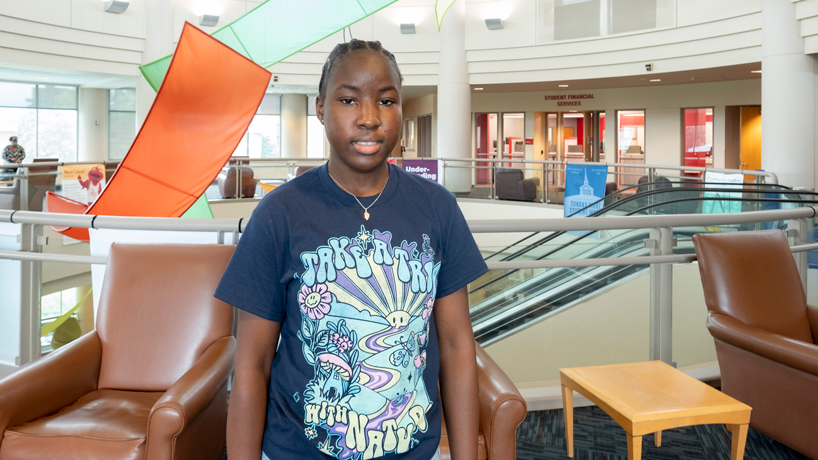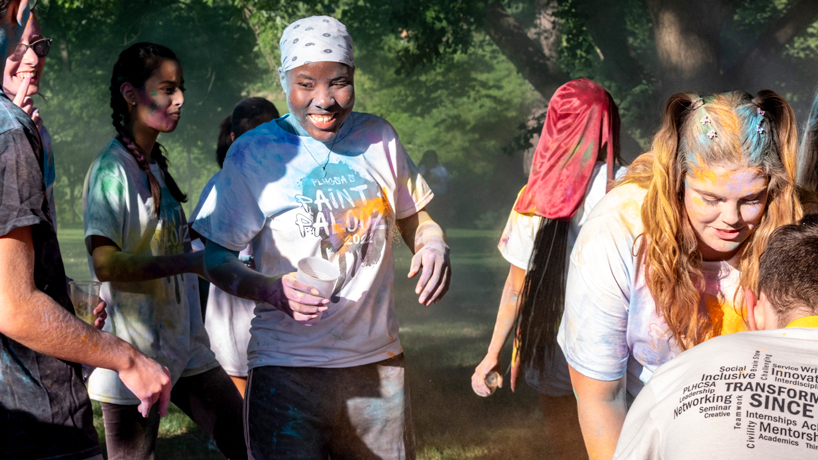
Shakinah Clarke grew up on the island of New Providence in The Bahamas and received a National Merit Scholarship to attend college in the United States. She plans to major in engineering as part of the UMSL/Washington University Joint Undergraduate Engineering Program. (Photos by August Jennewein)
Shakinah Clarke hasn’t wasted any time being homesick during her first semester at the University of Missouri–St. Louis.
Clarke, a Pierre Laclede Honors College student who hails from the island of New Providence in The Bahamas, has been actively engaged in campus activities since arriving in St. Louis for international student orientation in mid-August. She participated in Weeks of Welcome events such as Paint-A-Palooza and Stomp the Quad and was in attendance at the Brain Stew Pizza Party as she did her best to make friends around campus.
She’s quickly grown fond of working out or playing basketball with some of them at the Recreation and Wellness Center, has found a church group and last month took part in a volunteer project organized by Beyond Housing to help weed and pick up trash in a nearby neighborhood.
“I’ve been adjusting well,” Clarke said of her transition to school and living on her own. “The only thing I’ve found odd is the weather. I’m still getting used to it.”
Shakinah Clarke was all smiles while covered in powder puff paint in August after joining fellow students in taking part in Paint-A-Palooza, an event put on by the Pierre Laclede Honors College.
Given the day-to-day fluctuations that happen in Missouri, that might never happen. But Clarke has found some stability as part of a cohort of about 20 students from The Bahamas who have enrolled at UMSL through a partnership with the Ministry of Education.
The students are all either part of the Public School Scholars Programme or have received the National Tuition Assistance Scholarship, both of which provide scholarship funding to select Bahamian students pursuing their education abroad. UMSL is one of 33 partner institutions in the United States and Canada to be part of the Public School Scholars Programme, instituted in 2015 to promote college readiness, equity and access in the public school system in The Bahamas.
Being part of that group – including four students who attended the same high school in Nassau – has given Clarke a readymade support system. Most of the students are underclassmen and live near her in Oak Hall, though the cohort also includes a couple of graduate students.
“It’s been helpful to know the Bahamians here because we’ve sort of formed a community,” she said. “Sometimes on the weekends, the graduate students will come and get us, and we will just chill by their house or they will cook for us or take us to the store to get supplies. It’s been helpful to have them.”
But the group isn’t keeping to themselves. Clarke’s roommate, who is from Nigeria, and others often join them as they study in the lounges in Oak Hall or dine together at the Provincial House.
Among the Bahamian students, Clarke stood out, receiving one of the top scholarships available, the National Merit Scholarship, and she was set on using it to come to the United States to study engineering.
That’s something of a family passion.
Her mother once aspired to be an architect and now teaches engineering science, and her father works as an electrician and wanted to be an electrical engineer.
Her older brother, Charisma Clarke, is now pursuing a master’s degree in engineering at Florida Polytechnic University after earning his bachelor’s degree in mechanical engineering in 2021.
Shakinah Clarke was always a strong student in mathematics and science and discovered her own passion for engineering as a 10th grader when she joined the Technical Cadet Corps Programme, a three-year program that introduces high school students to technical skills and services.
“I was introduced to other fields of engineering, so I did electrical engineering, and I did electronics; I did water management; and I did radio and television,” Clarke said. “I got hands-on experience in it. We went on field trips to different places.”
Clarke’s participation in the program was cut short by the COVID-19 pandemic, but she saw enough to know she wanted to do more in the field. In particular, she set her sights on studying civil engineering, and she thought coming to an American university would provide greater opportunities. She said engineering programs in The Bahamas tend to only be offered for associate degrees.
She was beginning to research potential schools when she met Reggie Hill, UMSL’s vice chancellor for strategic enrollment. He encouraged her to consider UMSL and helped her with the process of getting her affidavit and student visa.
Hill also told Clarke about the UMSL/Washington University Joint Undergraduate Engineering Program, which offers an affordable and convenient engineering education for students pursuing bachelor’s degrees in civil, electrical or mechanical engineering. They complete two years of study at UMSL, taking mathematics, science and general education classes, before transitioning to the Washington University campus to complete the upper-level engineering courses.
As she dug deeper into researching the program, Clarke liked what she saw enough to decide to relocate – site unseen – to the middle of the United States.
“It was a good opportunity for me to be able to actually be in my major, get that experience and have the equipment and the professors there to help from both universities,” she said.
Clarke has no regrets. She’s been thriving in her early classes, including an introduction to engineering course, as well as geology, precalculus, cultural traditions and inquiries in social and behavioral sciences, and is already looking forward to what’s to come in the years ahead.















